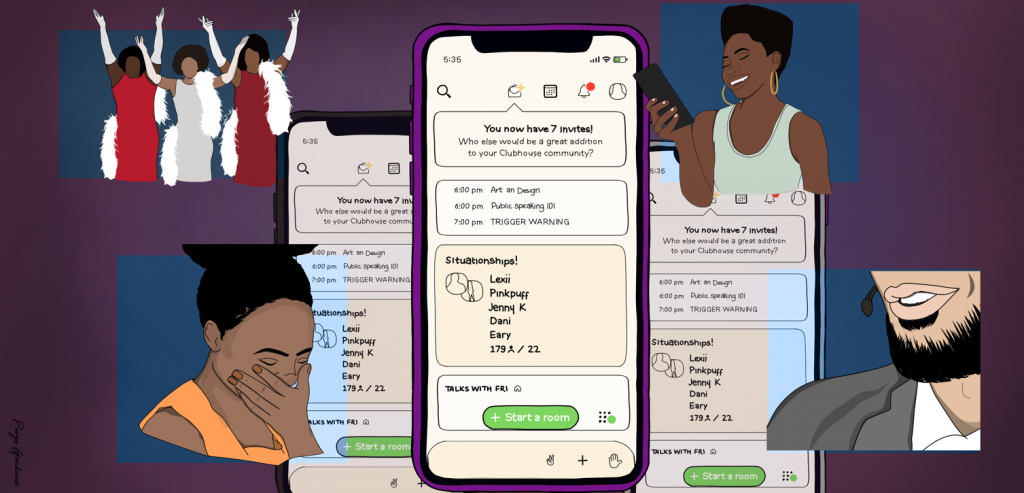What do Elon Musk, E-40 and Kevin Hart all have in common? They’re users of the popular social media application Clubhouse. The audio-first platform allows people to communicate in large groups, participate in conversations, and give the intimacy of voice without video’s additional pressures. The rise of Clubhouse is, of course, inextricably linked to the COVID-19 pandemic. People have been stuck at home, isolated and exhausted by their constant engagement with screens. ‘Zoom fatigue’, coupled with a need for intimacy and connection, has driven the audio platform’s increased use.

Illustration by Parys Gardener
Launching in March 2020, right at the start of the pandemic for many, Clubhouse substituted for conferences, talks and other in-person events. The app is invite-only and currently only available to Apple users. Billboard describes it as a virtual ‘Soho House’, priding itself on being exclusive through referrals. However, the app itself has grown dramatically, completely dominating the latter half of 2020. The app has 10 million regular users and is worth $1bn. Clubhouse is considered a unicorn startup that has set the trend of revolutionising social media apps going forward.
Voice-only apps and features are not a new phenomenon. Cappuccino allows you to listen to a daily podcast made up of the voices of your friends. WeChat’s audio messages have become a status symbol in China; WhatsApp’s voice notes have become an increasingly popular feature connecting people during lockdowns.
However, none of them have made as much of an impact in the space as Clubhouse. The app is ephemeral: you simply have to be there. There is no ‘+1’ or catch up on-demand; it requires your full attention and presence. The barriers to content creation and platform building are very low, making it highly accessible. There is everything from daily language classes to career seminars, live podcasts, workshops, musicals, and even spiritual tarot readings. The content is endless and detailed. There was famously a Lion King performance and a Dreamgirls show on the app, with auditions happening prior.
“It’s a perfect mix of chatrooms with a personal element of the human voice,” Jamilah E Toni, Senior Content Marketing Manager at Hopper HQ, tells me. “You can simply communicate your thoughts, opinions and facts (depending on the topic) without stress. It plays on the appeal of the human voice.”
The move towards rough-and-ready content production feels very different from the polished and clean-cut graphics we see in places such as YouTube, where high-quality content can get you far. Alex Erinle is the founder of the app Gist. It is in its early stages but the idea is to allow anyone from anywhere in the world to upload a recording of themselves sharing stories, thoughts or comments on anything they like.
“We’re in a time where someone could take a picture on their phone and get more likes than one taken with a studio camera,” Erinle tells me. “I think people are drawn to things that are much more authentic, real, raw and unedited, so these platforms can play out well.”
“It plays on the appeal of the human voice”
Additionally, Erinle points out that the success of Clubhouse is also due to consumers’ ability to catch on to new technology: “I feel like the future of any tech depends on the hardware; with things like ear pods, it was only a matter of time people didn’t want to listen to things pre-recorded, and they wanted to engage in real-time.”
He likens this to how Twitter gave users access to unfiltered thoughts live and direct from people they follow instead of waiting for lengthy blog posts. The increasing speed with which we communicate with online audiences is replicated with apps such as Snapchat – making people instantly accessible via video – and Instagram Live.
The popularisation of audio-based social media is changing the way and speed at which we make connections online in various ways, adds Jamilah E Toni: “Audio builds relations quicker than any written post or text messages, and I believe the other social media apps will start to engage in a lot more communication via audio features.”
Clubhouse’s unique ability to form close online tribes is symbolic in its club and room features that become online communities.
Kwasi Tandoh, a 27-year-old Project Officer, found working from home during lockdown difficult. “My work and home life blended into one, and so many distractions surrounding me. I had very little external structure and no direct accountability from staff members, all of which are important when managing ADHD,” he tells me.
Tandoh used Clubhouse to run morning accountability sessions with other users, and soon it became a hub for sharing information about the condition and how to get diagnosed.
“We were able to share personal experiences, traumas, struggles, wins, advice and tips in a safe and friendly space. People were also getting diagnosed and really able to open up – particularly Black women and women of colour. I think it highlighted the medical racism and how very often women of colour who have ADHD are completely dismissed or misdiagnosed by the medical profession and in education.”
Eventually, he turned the regular room into an official club. It became a much more democratic space, empowering both attendees and admins to have an active role in the space. “Members and followers themselves have also been creating their own rooms on bullet journaling sessions, mental health and tidying rooms, which is great to see,” he explains.
Though the app has brought many people together – creating a sense of community and belonging in an otherwise isolated time – it has serious faults. Fake news and online bullying aren’t unique to Clubhouse. Still, it is a problem they are continually coming up against because of the nature of undocumented and unmoderated content that is allowed to exist on the app.
Research conducted by the Pew Research Center found that 64% of people under 30 had experienced harassment online. Nearly half said the harassment was ‘severe’ – including physical threats, stalking and sexual harassment.
Abuse has become part of the online experience. Clubhouse discourages recording live conversations or screenshotting rooms to repost on other platforms. However, due to the app’s audio-first nature, there is no way of keeping a record of what people say to hold them accountable. The lack of saved content is particularly worrying as there have been many conversations about the increase in misinformation, particularly dubious claims about the COVID-19 vaccine.
Beyond the inevitable fake news on social media, Clubhouse has become a means for bullying and targeted harassment. Lack of moderation has allowed inflammatory content and bad faith conversations to dominate Clubhouse. When Black doctors attempted to correct vaccine misinformation on Clubhouse, users launched an attack. One harassment campaign that specifically targeted a young Black female doctor allegedly led to her attempted suicide.
Online bullying of Black women is a concerning problem that increases with your platform’s size – which is why MPs like Diane Abbott receive unprecedented levels of abuse online. Apps like Clubhouse have only seemed to intensify and personalise the specific vitriol directed towards Black women online.
Their increased accessibility adds to the dehumanisation: we cannot hide if we’re live on audio-first platforms. It becomes difficult to know when abuse is coming, avoid it and protect yourself.
Audio apps are now having to become innovative with the ways that they make their platforms safe. The tools used for moderation on social media centre on text rather than speech. Clubhouse has implemented mute and block options, while Twitter Spaces is toying with live transcriptions to flag inappropriate content. So far, nothing has proven entirely successful, and there remains a significant failure on the part of social media companies to protect their users in general but specifically on audio platforms.
Audio apps are not only facing new challenges when it comes to moderation, but data as well. Clubhouse records all conversations – “solely for the purpose of supporting incident investigations” according to the app’s privacy policy, deleting the audio unless a user reports a rules violation. A host of other privacy concerns have come to light, including the platform retaining access to personal information after users delete their account, and Clubhouse sharing personal data without actually informing users – all in the hope of later being able to monetise that information.
Users feeling unsafe or exposed on social media apps can lead to their downfall: when rumours of a potential hack on Houseparty surfaced, users began deleting the app en masse, putting an end to the platform’s short-lived success.
Since the success of Clubhouse, there have been more developments in the world of audio. Discord, an audio platform for gamers with 100 million users, has expanded its audiences to everyone. Changing its tagline to ‘your place to talk’, the reimagined platform advertises itself as a space that allows users to communicate with people “whether you’re part of a school club, gaming group or worldwide art community”. Twitter Spaces emulates Clubhouse but on your timeline, and Instagram are launching four-person Live Rooms, inspired by audio apps.
However, given the context in which these apps have become popular, will audio last beyond the pandemic? Erinle links it back to the advancement of physical technologies:
“I see audio apps disrupting traditional media like radio, particularly when consumers are in their cars on their commutes. If Clubhouse, for example, had a physical product that you could put in your car so you could engage with people, I see it taking over the radio space.”
Audio applications are introducing a whole new world of challenges in the social media space, which is exciting given the lull in social media innovation. However, so much more needs to be done to ensure that it is a safe and welcoming space that fosters good-faith conversations and counteracts bullying.







